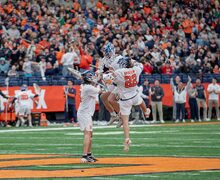Professors reflect on the presidency, death of Gerald Ford
When former President Gerald Ford died on Dec. 26, his last day as president was 29 years and 25 days in the past.
Today’s youth may only remember him for the trivia value of being the president who was never elected, but his influence did not die with his presidency, according to many Syracuse University professors.
‘People who are now very prominent got their start with Gerald Ford,’ said Margaret Thompson, a history professor, who teaches a course on the presidency. ‘The honorary pallbearers were an interesting group of people,’ she said alluding to three powerful members of the modern political landscape who made names for themselves working under Ford.
Both Vice President Dick Cheney and former Secretary of Defense Donald Rumsfeld worked as chiefs of staff under Ford.
Rumsfeld also served in Ford’s Cabinet as secretary of defense, and Robert Gates, President George W. Bush’s current secretary of defense, began his career as a Washington insider serving on the National Security Council during the Ford Administration.
While these men now make the decisions that shape our nation, in the 1970s it was Ford who was forced to make difficult decisions and face the critical response of a skeptical nation.
‘His legacy is his resolving of Watergate and ending the Vietnam War,’ said history professor Andrew Cohen.
The pardon of Richard Nixon was a defining moment in Ford’s presidency, as the nation was weary of the Watergate scandal but also unfulfilled by the quick resignation.
‘It was very unpopular, literally and figuratively, it was undemocratic,’ Cohen said about pardoning Nixon. ‘Ford never had the legitimacy that comes with being elected. It was seen as representing this corrupt bargain.’
Yet, when eulogizing his predecessor last month, Bush said, ‘When he was elevated to the presidency, it was because America needed him, not because he needed the office.’
Ford became president under unique circumstances in a tense political atmosphere. He had been appointed vice president by Nixon in 1973 in the wake of Vice President Spiro Agnew’s resignation, and took office following a vote of confirmation by the Senate.
His appointment was the first time that the Vice Presidential-Vacancy Clause of the 25th Amendment had been exercised. Ford’s tenure as vice president was brief. Ten months after being placed in the office, he became president.
The speeches and news coverage following Ford’s death solidified him as the president who united the nation in the wake of Watergate. While in office, however, his presidential policies were not considered excellent, as he dealt with both the end of the Vietnam War and a poor economy highlighted by runaway inflation.
The week following Ford’s death was consumed with coverage of powerful men delivering gratuitous eulogies and live shots of Americans waiting in line to pay their last respects to the 38th U.S. president.
Ford’s long life after the presidency and his old age – he was the oldest president ever at 93 years and 165 days old – played an important role in the public’s perspective of him later in life, Thompson said.
His classy post-presidential career, especially his late-life friendship with former opponent, President Jimmy Carter, and his legacy as one of the last presidents with old-school Republican virtues helped cement a positive image in the years before his death, Thompson said.
In the aftermath of a man’s death, there is a tendency to a put a positive spin on his achievements, Cohen said.
‘I don’t think he is worth remembering for any of the great policies he put forth,’ he said.
Cohen explained that the memorializing of Ford, and the national resolve he stood for, had the intent of influencing current democrats to avoid spectacular and over-hyped hearings concerning the Bush administration’s conduct of the war.
‘It’s a way for official Washington and the media that live there to say to the democrats that just won office, ‘Don’t be punitive to this administration,” Cohen said. ‘They are saying, ‘Do what Ford did.”
The celebration of Ford’s life may have touched the hearts of those who found comfort in his humble mannerisms as president, but for the generations born under Reagan, Ford’s legacy may be in the archives of Saturday Night Live, Thompson said.
Many students will remember Ford as ‘the guy that Chevy Chase made fun of on S.N.L. They think of him as clumsy and bumbling,’ Thompson said.
Chase often performed skits on the popular sketch comedy program depicting Ford falling over himself, incapable of walking around the oval office. These scenes are paradoxical of Ford’s athletic resume that includes leading the University of Michigan to two national championships and serving as captain of his high school football team.
‘He was probably the greatest athlete to ever see the presidency,’ noted Cohen, who attributes the bumbling and clumsy representations to Ford’s incapability to suppress the rising inflation rates in America in the 1960s.
His prosperity during his 30 year career as former president ensured he would receive the grand and traditional farewell reserved for royalty in other countries and given to presidents in America, Thompson said.
‘He didn’t attempt to occupy the public stage,’ Cohen said of Ford’s golf-filled years as a retired politician, ‘that’s a good way to get people to like you.’
‘If you live long enough, they’ll forgive you for anything,’ he said.
Published on January 15, 2007 at 12:00 pm





